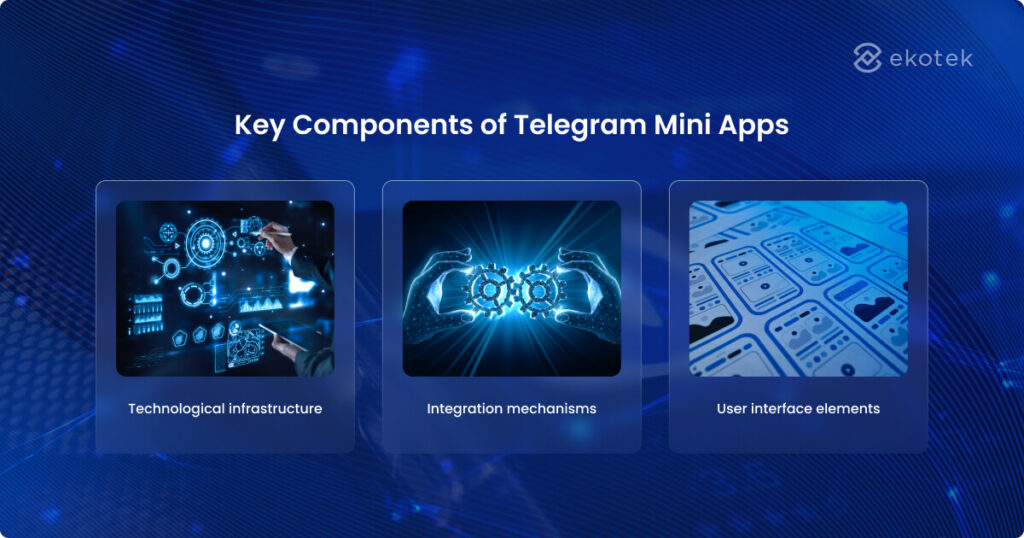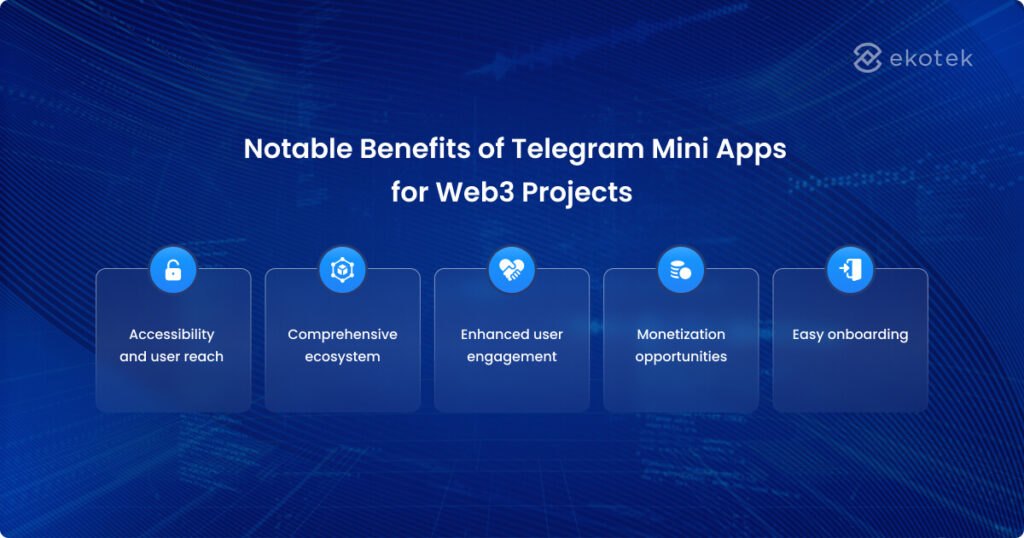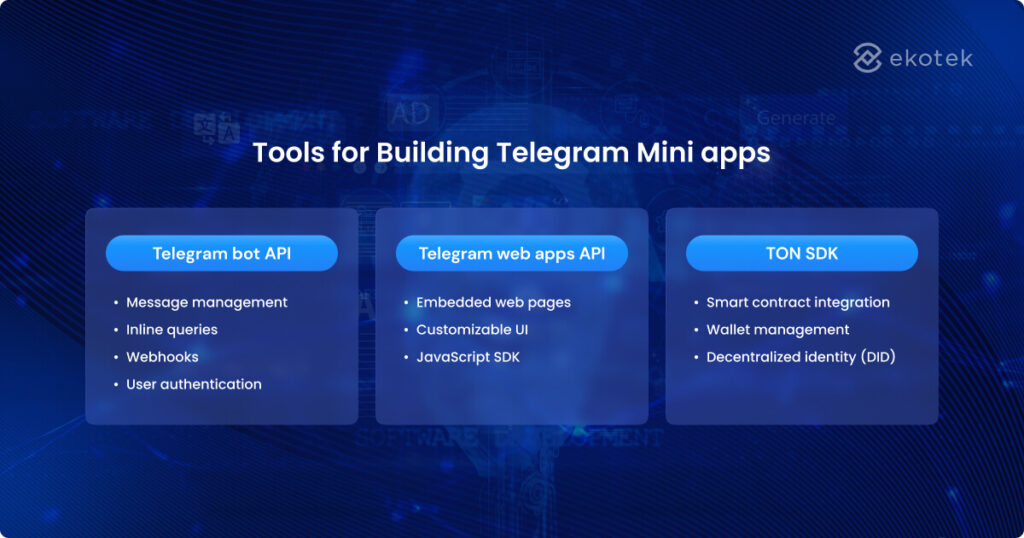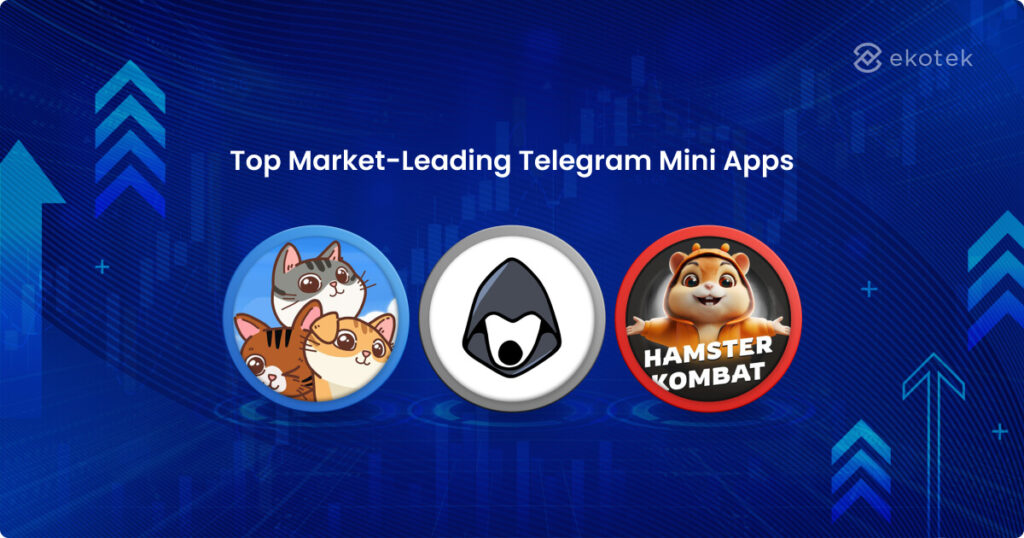
- 1
- 2
- 3
- 4
- 5
- 6
- 7
Blockchain is gaining significant global attention, with more individuals and businesses eager to explore its potential. However, the path to Web3 adoption is often hindered by various roadblocks. One of the biggest challenges Web3 projects face is onboarding Web2 users seamlessly into decentralized ecosystems. The gap between Web2 traditional user and Web3 space calls for an effective bridge that accelerates user acquisition while simplifying the onboarding journey. This is where Telegram mini apps, developed by TON (The Open Network), come into play.
Telegram mini apps are designed to bring the power of decentralized technologies to over 900 million active Telegram users worldwide, offering an intuitive, friendly interface for users who may not yet be comfortable navigating Web3 platforms. With mini apps, users can interact with blockchain services, manage crypto assets, and participate in decentralized communities – all without leaving the Telegram ecosystem. By tapping into Telegram’s vast user base and robust infrastructure, these mini-apps are becoming essential tools for Web3 projects looking to drive mass adoption. In this article, we’ll explore how Telegram mini apps are revolutionizing the web3 market, their core components, and the unique benefits they bring to decentralized projects.
Overview of Telegram mini apps
Definition and explanation of Telegram mini apps
A Telegram mini app is a blockchain-based application designed to operate within the Telegram platform, specifically catering to the needs of Web3 users. These apps provides a lightweight solution that can perform many tasks, from managing cryptocurrency wallets, playing games to facilitating e-commerce transactions, all while operating within the secure confines of the Telegram environment.
Telegram mini apps are developed to be fast, responsive, and easy to use, leveraging both Telegram’s robust API and blockchain protocols like TON. This integration allows developers to create mini apps that utilize blockchain functionalities, including smart contracts, token transfers, and decentralized identity solutions while benefiting from Telegram’s native features like messaging, notifications, and user authentication.
TON (The Open Network) Ecosystem
At the heart of the Telegram mini app ecosystem lies TON, a decentralized blockchain network created by the community using a technology designed by Telegram. TON’s blockchain technology plays a crucial role in the functionality of many Telegram mini apps, particularly those related to Web3. The network was envisioned to leverage Telegram’s expansive user base and integrate seamlessly with the messaging app, enabling frictionless transactions, smart contracts, and other blockchain-powered features.
TON can address some of the key limitations of existing blockchains, particularly in terms of performance and accessibility. One of the core differentiators of TON is its infinite sharding technology, which enables the network to dynamically split into smaller chains (shards) as demand increases, allowing for near-instant transactions. This makes TON particularly well-suited for applications that require high throughput, such as Web3 mini apps with large user bases. Another standout feature is TON’s native support for cross-chain interoperability, allowing developers to bridge assets and services between TON and other blockchains, such as Ethereum, without friction. Moreover, TON is built with Proof of Stake (PoS) consensus, which ensures both performance and security, making it a sustainable choice for Web3 developers. This creates a robust environment for Web3 projects to thrive, combining the decentralized power of blockchain with the ease of Telegram’s massive user base.
Key components of Telegram mini apps
Technological infrastructure
The technological backbone of a Telegram mini app is its ability to operate within the Telegram platform while interacting with external servers and services. This is made possible by Telegram’s Bot API, which allows developers to create bots that function as the interface between the user and the mini app. These bots can handle user input, process data, and communicate with external APIs, effectively turning Telegram into a versatile platform for app development.
The Bot API is complemented by Telegram’s Web Apps API, which enables developers to build full-featured web apps that run inside Telegram. This API provides the necessary tools for creating rich, interactive user interfaces that feel native to the Telegram environment. Additionally, Telegram’s secure cloud infrastructure ensures that mini apps are highly available and can scale to meet the demands of a growing user base.
For Web3 projects, the integration of blockchain technology into the Telegram mini app’s infrastructure is a critical component. By leveraging the TON blockchain or other compatible networks, developers can incorporate decentralized features such as cryptocurrency wallets, smart contracts, and decentralized identities (DIDs) into their mini-apps. This integration ensures that Web3 mini apps remain true to the principles of decentralization and user control.
Integration mechanisms
A key strength of Telegram mini-apps is their ability to seamlessly integrate with other services and platforms. This is achieved through a combination of APIs, webhooks, and external services that allow the mini-app to interact with third-party applications. For example, a Telegram mini app might integrate with a cryptocurrency exchange API to enable real-time trading directly within the Telegram interface, or it might use a payment gateway API to facilitate in-app purchases.
Telegram mini apps can connect to decentralized exchanges (DEXs), decentralized finance (DeFi) platforms, and other blockchain-based services to provide users with access to the full spectrum of Web3 offerings. This integration is often facilitated by smart contracts, which automate transactions and ensure that they are executed transparently.
The ability to integrate with a wide range of services makes Telegram mini apps highly versatile, enabling them to serve as a hub for various Web3 activities. Whether it’s managing digital assets, participating in decentralized governance, or engaging with community-driven projects, Telegram mini apps can provide a unified experience that brings together all aspects of the Web3 ecosystem.
User interface elements
The user interface (UI) of a Telegram mini app is designed to be intuitive and user-friendly, leveraging the familiar Telegram interface to reduce the learning curve for users. The UI is typically built using web technologies such as HTML, CSS, and JavaScript, which are rendered within the Telegram app itself. This allows developers to create visually appealing and highly interactive interfaces that feel native to Telegram.
Whether users are accessing the mini-app on a smartphone, tablet, or desktop, the interface remains the same, providing a seamless experience regardless of the device. This consistency is crucial for Web3 projects, which often rely on user engagement across multiple platforms.
The UI of a Telegram mini app can also be customized to reflect the branding and identity of the Web3 project it supports. This customization extends to elements such as color schemes, fonts, and logos, allowing developers to create a cohesive brand experience within the Telegram environment. Additionally, the UI can incorporate features such as push notifications, chatbots, and interactive elements to enhance user engagement and drive adoption.

Benefits of using Telegram mini apps for Web3 projects
Accessibility and user reach
Telegram boasts over 900 million active users globally, providing an extensive user base that Web3 projects can tap into. By developing a mini app for Telegram, Web3 projects can instantly reach a large and diverse audience without the need for users to download a separate app. This ease of access lowers the barrier to entry, making it easier for users to engage with Web3 services.
Moreover, Telegram mini apps can be easily shared within the platform, allowing them to spread virally through Telegram groups, channels, and direct messages. This viral potential is particularly valuable for Web3 projects that rely on community-driven growth and word-of-mouth marketing.
Comprehensive ecosystem
Telegram mini apps benefit from the robust infrastructure of the Telegram ecosystem, which offers an array of tools and features for Web3 projects. Developers can build complex, feature-rich applications that integrate seamlessly with TON, enabling smooth interactions with blockchain services. Telegram’s infrastructure supports secure, decentralized operations, making it a versatile platform for Web3 projects.
This comprehensive ecosystem simplifies the development process for Web3 projects, allowing them to leverage Telegram’s existing tools for user authentication, payments, and notifications. Using these built-in tools reduces development costs and enhances the overall user experience.
Enhanced user engagement
Telegram mini apps offer a range of features that can enhance user engagement, making them an ideal choice for Web3 projects that rely on active community participation. For example, mini apps can use push notifications to keep users informed about new developments, events, or opportunities within the Web3 ecosystem. They can also integrate with Telegram’s messaging and group features to facilitate real-time communication and collaboration among users.
Gamification is another powerful tool for driving user engagement, and Telegram mini apps are well-suited for implementing gamified experiences. Whether it’s rewarding users for completing tasks or contributing to the community, gamification can help Web3 projects build a loyal and active user base.
Monetization opportunities
Telegram mini apps provide Web3 projects with a variety of monetization options. Developers can implement P2E models, in-app purchases, staking rewards, and token-based economies directly within the mini app. This flexibility allows Web3 projects to generate revenue while providing real financial incentives to users.
In addition, Telegram’s integration with blockchain technology facilitates seamless payments and cryptocurrency transactions, making it easy for users to earn, trade, or purchase digital assets within the app.
Easy onboarding
Since Telegram already handles account creation and authentication, Web3 projects can bypass the need for complex setups or identity verifications. This simplifies the user journey, making it easier for people unfamiliar with Web3 to get started without the technical barriers that often discourage mainstream users.
Telegram mini apps help bridge the gap between Web2 and Web3, making blockchain-based services more accessible to a broader audience. This is particularly useful for projects aiming to onboard users from traditional platforms to decentralized services.
🔎 Explore how Ekotek built an engaged Web3 community with gamified Telegram mini apps

Tools for building Telegram mini apps
Developing a Telegram mini-app requires a combination of the right tools and technologies to create a seamless, efficient, and user-friendly experience. Below are some essential tools and resources that developers can utilize to build high-quality Telegram mini apps, particularly for Web3 projects.
Telegram bot API
The Telegram bot API is the cornerstone of mini-app development on the platform. It allows developers to create bots that serve as the interface for their mini-apps, handling tasks such as receiving user input, sending messages, and interacting with external services. The API is well-documented and provides extensive functionality, enabling developers to build everything from simple bots to complex, feature-rich applications.
Key features of the Telegram bot API
- Message management: Send and receive messages, photos, files, and more.
- Inline queries: Allow users to interact with your bot directly from the chat interface.
- Webhooks: Set up real-time communication between your bot and your server.
- User authentication: Verify user identity and integrate with third-party authentication services.
Telegram web apps API
The Telegram web apps API is specifically designed to help developers create web-based applications that run inside Telegram. It allows for the creation of interactive and dynamic user interfaces, which can be customized to suit the needs of your Web3 project. The web apps API supports modern web technologies like HTML, CSS, and JavaScript, enabling the development of responsive and visually appealing mini-apps.
Some key features of the Telegram web app API
- Embedded web pages: Integrate web pages that are accessible within Telegram, creating a native-like experience.
- Customizable UI: Design user interfaces that align with your brand and project needs.
- JavaScript SDK: Utilize the SDK to interact with the Telegram app and retrieve user data, send messages, and manage app states.
TON SDK
TON provides a decentralized infrastructure that supports various blockchain-based services, making it an ideal choice for Web3 projects. The TON SDK offers a range of features that allow developers to integrate smart contracts, manage cryptocurrency wallets, and interact with dApps within their Telegram mini apps.
Key functionalities of the TON SDK
- Smart contract integration: Deploy and interact with smart contracts on the TON blockchain.
- Wallet management: Create and manage cryptocurrency wallets directly within the mini app.
- Decentralized identity (DID): Implement decentralized identity solutions to enhance user security and privacy.

Top market-leading Telegram mini apps
Catizen
Catizen revolves around a virtual world where users can adopt, raise, and upgrade their virtual cats while completing tasks to earn rewards. Developed on TON, Catizen combines play-to-earn (P2E) mechanics with advanced elements like AI, Metaverse, and GameFi. These features provide players with an immersive gaming experience while also offering real opportunities to earn profits through gameplay.
Within just a month of its open beta launch, Catizen attracted a staggering 2.3 million total users, including over 220,000 on-chain participants and more than 520,000 daily active users. The platform also saw significant transaction activity, with users executing over 2.6 million on-chain transactions in the same period, leading to revenue surpassing $3 million USD.
DOGS
DOGS has gained significant attention as a memecoin project integrated within the Telegram platform. DOGS focuses on the community-driven nature of memecoins, allowing users to interact with the token ecosystem directly within Telegram. It leverages the viral appeal of memecoins by providing a simple, user-friendly interface for buying, trading, and managing DOGS tokens.
Within just 24 hours, DOGS reached 1 million users on Telegram and has climbed into the top 100 cryptocurrencies by market capitalization as of September 2024. In August 2024, DOGS was launched on Binance, where participants could earn DOGS tokens by staking BNB or FDUSD. This listing gave DOGS greater visibility and liquidity through the world’s largest cryptocurrency exchange.
Hamster Kombat
Hamster Kombat is a tap-to-earn game that has quickly gained popularity within the Telegram mini app ecosystem. Players earn rewards by simply tapping on in-game characters to collect coins. To earn more coins, users must complete daily tasks such as logging in, watching ads, and following the game’s social media channels. Additionally, they can invite others to join the game, earning between 5,000 and 25,000 coins per referral, with higher rewards for premium Telegram accounts.
The game’s rapid rise in popularity has led to a vibrant and active community with over 50 million subscribers on its official Telegram channel and 11 million followers on Twitter. Hamster Kombat boasts 250 million active players, solidifying its position as a beloved favorite among gamers around the world.

Conclusion
Telegram mini apps are rapidly transforming the Web3 landscape by offering a seamless, integrated experience within a widely-used platform. With their ability to facilitate everything from community building to secure transactions, these mini-apps are becoming essential tools for projects that prioritize decentralization and user engagement.
For Web3 projects looking to harness the full potential of Telegram mini apps, partnering with an experienced development team is crucial. Ekotek, a Clutch-verified leader in blockchain and software development, stands out as a premier provider of Telegram mini app development services. With a deep understanding of both the Telegram platform and the Web3 landscape, Ekotek offers tailored solutions that ensure rapid deployment, seamless integration, and high-quality user experiences. If you have an idea of building a Telegram mini app, don’t hesitate to contact us, our experts are eager to help you turn ideas into reality.
FAQ
1. Can Telegram mini apps integrate with blockchain and Web3 technologies?
Yes, Telegram mini apps can integrate with blockchain networks such as TON, Ethereum, and others, allowing for functionalities like cryptocurrency transactions, decentralized identity, and smart contract interactions, making them ideal for Web3 projects.
2. How can a Telegram mini app be monetized in a Web3 environment?
Telegram mini apps can be monetized through various Web3 mechanisms such as tap-to-earn models, integrating cryptocurrency payments, offering NFT sales, or leveraging affiliate marketing programs. These features allow users to earn rewards or engage in in-app purchases directly within the Telegram platform.
3. What is the process for creating a Telegram mini app for a Web3 project?
To create a Telegram mini app, developers use tools like the Telegram Bot API and Web Apps API, combined with blockchain development kits (such as TON SDK) for Web3 functionality. The process involves building the app interface, integrating blockchain wallets, smart contracts, and ensuring smooth communication between the mini-app and decentralized networks.
- 1
- 2
- 3
- 4
- 5
- 6
- 7